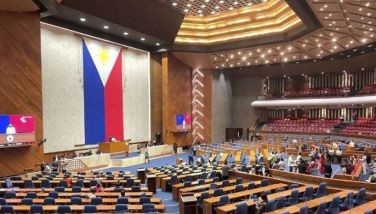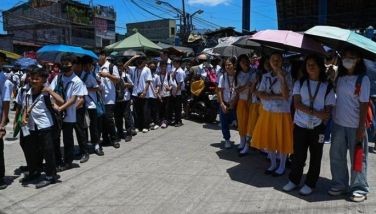‘Nicole’ was drunk at the time of rape — witness
July 26, 2006 | 12:00am
The woman who filed rape charges against four United States Marines was not capable of having consensual sex on the night of the alleged assault since she was highly intoxicated, a prosecution witness testified yesterday.
Medical toxicologist Dr. Kenneth Go, who took the witness stand yesterday at the Makati City regional trial court, said the complainant was definitely drunk and her level of intoxication impaired her judgment and cognitive functions.
The complainant, identified only as "Nicole," is the 22-year-old daughter of a Philippine Navy captain. She claims that after drinking with Lance Corporal Daniel Smith at a bar at the Subic Freeport in Zambales on the night of Nov. 1 last year, he raped her inside a van that was driven around the freeport while his three colleagues cheered him on.
The three other accused are Staff Sergeant Chad Carpentier and Lance Corporals Dominic Duplantis and Keith Silkwood.
With slides that showed how he and six other certified medical toxicologists studied the alcoholic drinks that Nicole drank on the night of the alleged rape, Go told the court how Nicole’s learning, thinking, and recall as well as her ability to make a judgment call were impaired.
With the aid of a projector, Go cited the alcohol level of each drink and how he and his colleagues computed it to determine how each raised Nicole’s blood alcohol level (BAL).
He discussed the composition of vodka-Sprite, B-52, B-53, Singapore Sling, Long Island iced tea, and Bullfrog and their effect on Nicole considering her body weight, the volume of consumption, specific gravity, and other factors.
After consuming all six drinks, Go said Nicole’s BAL was already at 445.2. He pointed out that in the United States, a person with 100 BAL can no longer be allowed to drive a motor vehicle.
Go said this very high level of intoxication severely impairs physical ability, motor coordination, memory, judgment, perception, and control of muscle movements.
Answering questions asked by Evalyn Ursua, Nicole’s private lawyer, Go said a 445.2 level of intoxication impairs a person’s capability to resist an attack and respond to a violent stimulus. It also makes one unable to sense impending danger, make sound decisions, and defend or resist.
He said that insofar as Nicole’s condition is concerned on the night of the alleged rape, she did not have the capacity to consent to sexual intercourse.
Go also testified that very high levels of alcohol in the blood would explain why Nicole could not remember a lot of things as well as people who saw her after she was allegedly raped.
He referred to this as "alcoholic blackouts" or "anterograde amnesia," more commonly known as fragmented amnesia.
"This, in fact, is one of the damage alcohol can do on the part of the cognitive functions of the brain," Go told the court.
During his testimony, Go also said that the interval by which the alcoholic drinks were taken, which Nicole could not remember, does not matter much.
He said Nicole’s behavioral manifestations such as "dizziness, lantang gulay, bakay-bakay, hinang-hina at gustong matulog (showing signs of being limp as a vegetable, being carried piggyback out of the bar, weakness, and wanting to sleep)," and even going into hysterics when she was asked a question at the hospital after the alleged rape are consistent and compatible with her level of intoxication on the night of the alleged assault.
Go, a certified medical pharmacologist and toxicologist, was the prosecution’s third "expert" witness to take the stand.
Branch 139 Judge Benjamin Pozon accepted him as an expert witness after Go convinced the court that he is knowledgeable enough in the field of toxicology to render an expert opinion.
During cross-examination, Jose Justiniano, Silkwood’s lawyer, asked Go why he and his colleagues failed to consider that the alcoholic drinks were served with ice.
Justiniano also asked Go why Nicole and her stepsister could not remember what time they consumed each drink but could remember other things.
Medical toxicologist Dr. Kenneth Go, who took the witness stand yesterday at the Makati City regional trial court, said the complainant was definitely drunk and her level of intoxication impaired her judgment and cognitive functions.
The complainant, identified only as "Nicole," is the 22-year-old daughter of a Philippine Navy captain. She claims that after drinking with Lance Corporal Daniel Smith at a bar at the Subic Freeport in Zambales on the night of Nov. 1 last year, he raped her inside a van that was driven around the freeport while his three colleagues cheered him on.
The three other accused are Staff Sergeant Chad Carpentier and Lance Corporals Dominic Duplantis and Keith Silkwood.
With slides that showed how he and six other certified medical toxicologists studied the alcoholic drinks that Nicole drank on the night of the alleged rape, Go told the court how Nicole’s learning, thinking, and recall as well as her ability to make a judgment call were impaired.
With the aid of a projector, Go cited the alcohol level of each drink and how he and his colleagues computed it to determine how each raised Nicole’s blood alcohol level (BAL).
He discussed the composition of vodka-Sprite, B-52, B-53, Singapore Sling, Long Island iced tea, and Bullfrog and their effect on Nicole considering her body weight, the volume of consumption, specific gravity, and other factors.
After consuming all six drinks, Go said Nicole’s BAL was already at 445.2. He pointed out that in the United States, a person with 100 BAL can no longer be allowed to drive a motor vehicle.
Go said this very high level of intoxication severely impairs physical ability, motor coordination, memory, judgment, perception, and control of muscle movements.
Answering questions asked by Evalyn Ursua, Nicole’s private lawyer, Go said a 445.2 level of intoxication impairs a person’s capability to resist an attack and respond to a violent stimulus. It also makes one unable to sense impending danger, make sound decisions, and defend or resist.
He said that insofar as Nicole’s condition is concerned on the night of the alleged rape, she did not have the capacity to consent to sexual intercourse.
Go also testified that very high levels of alcohol in the blood would explain why Nicole could not remember a lot of things as well as people who saw her after she was allegedly raped.
He referred to this as "alcoholic blackouts" or "anterograde amnesia," more commonly known as fragmented amnesia.
"This, in fact, is one of the damage alcohol can do on the part of the cognitive functions of the brain," Go told the court.
During his testimony, Go also said that the interval by which the alcoholic drinks were taken, which Nicole could not remember, does not matter much.
He said Nicole’s behavioral manifestations such as "dizziness, lantang gulay, bakay-bakay, hinang-hina at gustong matulog (showing signs of being limp as a vegetable, being carried piggyback out of the bar, weakness, and wanting to sleep)," and even going into hysterics when she was asked a question at the hospital after the alleged rape are consistent and compatible with her level of intoxication on the night of the alleged assault.
Go, a certified medical pharmacologist and toxicologist, was the prosecution’s third "expert" witness to take the stand.
Branch 139 Judge Benjamin Pozon accepted him as an expert witness after Go convinced the court that he is knowledgeable enough in the field of toxicology to render an expert opinion.
During cross-examination, Jose Justiniano, Silkwood’s lawyer, asked Go why he and his colleagues failed to consider that the alcoholic drinks were served with ice.
Justiniano also asked Go why Nicole and her stepsister could not remember what time they consumed each drink but could remember other things.
BrandSpace Articles
<
>
- Latest
- Trending
Trending
Latest
Trending
Latest
Recommended
January 21, 2025 - 12:00am




























